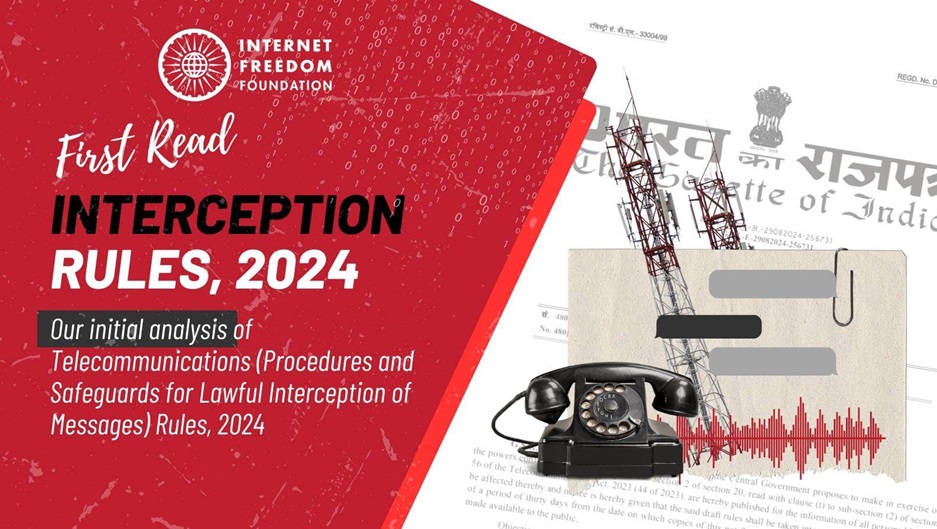- Courses
- GS Full Course 1 Year
- GS Full Course 2 Year
- GS Full Course 3 Year
- GS Full Course Till Selection
- Online Program
- GS Recorded Course
- NCERT (Recorded 500+ Hours)
- Polity Recorded Course
- Geography Recorded Course
- Economy Recorded Course
- AMAC Recorded Course
- Modern India, Post Independence & World History
- Environment Recoded Course
- Governance Recoded Course
- Science & Tech. Recoded Course
- International Relations and Internal Security Recorded Course
- Disaster Management Module Course
- Ethics Recoded Course
- Essay Recoded Course
- Current Affairs Recoded Course
- CSAT
- 5 LAYERED ARJUNA Mentorship
- Public Administration Optional
- ABOUT US
- OUR TOPPERS
- TEST SERIES
- FREE STUDY MATERIAL
- VIDEOS
- CONTACT US
What Are the New Interception Rules and Safeguards?
What Are the New Interception Rules and Safeguards?

On December 6, 2024, the Union Government announced the Telecommunications (Procedures and Safeguards for Lawful Interception of Messages) Rules, 2024. These new rules give some enforcement and security agencies the power to intercept phone messages under certain conditions. The new rules replace the older Rule 419A of the Indian Telegraph Rules, 1951.
Key Features of the New Rules:
- Who Can Authorize Interceptions?
- The Union Home Secretary and the Secretary of the Home Department in each State can now order interceptions of phone messages or a group of messages.
- In addition, an officer not below the rank of Joint Secretary to the Union Government can issue an interception order in "unavoidable circumstances". However, the rules do not explain what counts as "unavoidable circumstances."
- Interceptions in Remote Areas or Operational Challenges:
- In areas where it is difficult for the competent authority to issue orders, such as remote locations or due to operational challenges, senior officers of authorized agencies can order interceptions.
- At the central level, the head or second senior-most officer can issue such orders.
- At the State level, the head or second senior-most officer of the authorized agency (not below the rank of IG Police) can also issue interception orders. These orders must be sent to the competent authority within three working days.
- Review and Confirmation:
- If the competent authority does not confirm an interception order within seven working days, the interception will stop. Additionally, any intercepted messages cannot be used for any purpose, including as court evidence.
- The rules also require that the authorized agencies destroy interception records every six months, unless these records are needed for ongoing work or are required by a court.
How Do the New Rules Differ from the Old Ones?
- Relaxed ‘Emergent Cases’ Condition:
- Under the old rules (Rule 419A), interceptions could only happen in emergent cases.
- The new rules have relaxed this condition, allowing interceptions even when it is not possible for the competent authority to issue orders, such as in remote areas or under operational difficulties.
- Limits on State-Level Authorizations:
- Under the old rules, there was no limit on how many IGP-rank officers at the State level could authorize interceptions.
- Now, only the head of the agency and one more senior officer (the second senior-most) at the State level can issue interception orders.
- Consequences of Unconfirmed Orders:
- If an interception order is not confirmed within seven days, the intercepted messages cannot be used for any purpose, including court evidence.
- This rule helps prevent the abuse of power by ensuring that only valid and confirmed interception orders are used.
- Destruction of Records:
- The new rules require the destruction of interception records every six months, unless they are needed for work purposes or ordered by a court. This improves accountability and ensures that intercepted information is not kept longer than necessary.
Background and Legal Context:
The Indian Telegraph Act of 1885 allowed the Union Government to make rules to prevent the improper interception or sharing of messages. However, comprehensive safeguards were not put in place for many years.
- In 1996, the Supreme Court ruled on the case People’s Union for Civil Liberties (PUCL) vs. Union of India. The Court said that the right to privacy could not be taken away without just and fair rules.
- As a result, the government introduced Rule 419A in 2007, which set the procedures for lawful interception following the Supreme Court’s instructions.
Concerns about the New Rules:
While the new rules introduce some safeguards, there are concerns about misuse of interception powers and the lack of accountability.
- Relaxed Conditions for Interception:
- The rules now allow interceptions even without an urgent reason, which could lead to unnecessary surveillance.
- The term "unavoidable circumstances" is not clearly defined, which means it could be open to broad interpretation and could lead to excessive use of the powers.
- Lack of Accountability for Misuse:
- The new rules do not provide a clear way to hold agencies accountable if they misuse their interception powers.
- There is no punishment mentioned for any abuse, such as intercepting messages before they are confirmed by the competent authority within the seven-day period.
- Risk of Overreach:
- With the power to issue interception orders now given to higher officers, including in remote areas or when there are operational challenges, there is a concern that this could lead to wide-scale surveillance without proper checks in place.
- The rules do not provide enough protection for privacy, and critics argue that they could be used for political or personal reasons.
Conclusion:
The new Telecommunications (Procedures and Safeguards for Lawful Interception of Messages) Rules, 2024 change the way interceptions are handled by giving more powers to certain agencies. While the rules improve clarity and add some safeguards, there are concerns about the potential for misuse of these powers.
| Also Read | |
| UPSC Prelims Result | UPSC Daily Current Affairs |
| UPSC Monthly Mgazine | Previous Year Interview Questions |
| Free MCQs for UPSC Prelims | UPSC Test Series |
| ENSURE IAS NOTES | Our Booklist |




